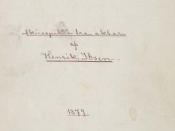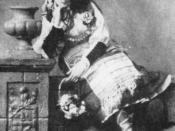Pride and Consequences in A Doll's House and The House of Bernarda AlbaThe House of Bernarda Alba and A Doll's House, by Frederico Garcia Lorca and Henrik Ibsen respectively, are two similar plays written at different times. In 1964, Frederico's The House of Bernarda Alba debuted in Madrid Spain, thirty-one years after it's birth in 1933. It pioneered the style of surrealistic imagery, popular folklore and was written in prose. A Doll's House was published in 1879 and appeared on stage that year in Copenhagen. Originally written in Dano-Norwegian known as Riksmal, its read in translation almost exclusively. It was released with a cast of male and female performers, in opposition to The House of Bernarda Alba with only female characters. Although these stories were written in two completely separate eras, they depict similar scenarios. They each reveal a dominant character pitted against a female character who is rebellious to the traditional social order.
In A Doll's House, Torvald is the dominating character manipulating his wife and treating her like a doll. In The House of Bernarda Alba, Bernarda is the dominating figure in charge of bossing her daughters around, and, more importantly causing the downfall of her youngest daughter Adela. Thus, both stories have a single figure in charge of pushing the less powerful woman or women around. In addition, both stories show broken relationships, and the downfall of main characters. However, the underlying theme, which ties these two plays together, is pride. Pride is both the root of social order and the cause of downfalls. It breaks relationships and splits families in one case, while restoring life in the other. Pride is an ever-present force in both of the plays, The House of Bernarda Alba and A Doll's House, affecting the details, characters, and even the outcomes.
Pride is a strong force in both plays, unyielding and antagonizing, it serves as a cast-iron vice from which the main characters cannot escape. It's the force that drives Adela onward in her battle for freedom and portrays her as a woman ahead of her time. Pride is the opposing force against Adela. Bernarda is a forceful dictator and places the families pride ahead of happiness. Bernarda states "I keep watch; so people won't spit when they pass our door" (Garcia Lorca 182). Adela is confined to dictatorship and rules. Pride also serves as opposition to Bernarda. It is a dark cloud cast over her head, as she fears becoming like her mother and losing pride in the community. "â¦History repeats itself" (Garcia Lorca 169) was said in a comparison between Adela's mother and grandmother. In the play, A Doll's House, Torvald allows his pride to come between him and his wife, causing a deceitful marriage. Torvald once said "â¦happiness is not the question; all that concerns us is to save the remains, the fragments, the appearance-" (Ibsen 63). Central to both plays, pride is seen almost as a character. It sometimes holds characters back, while others it thrusts stumbling forward. Always, however, its impact can be felt and its imprint can be seen.
The dominant characters in both plays are rulers of their domain. Bernarda self-righteously rules her household emphasizing pride and status. Even when her maid Poncia has valid opinions, she does not listen. "â¦. Work and keep your mouth shut. The duty of all who work for a living" (Garcia Lorca 192). Bernarda rules quick and harsh, as she wants to be a decisive ruler with no guidance. However, Torvald is the ruler of a much smaller household. He wants his house to be a place of discipline, order, and respect. As with Bernarda, dominance is based on pride. This is revealed when he said, "I would gladly work night and day for youâ¦But no man would sacrifice his honor for the one he loves" (Ibsen 70)" Torvald is more concerned with "honor" that others hold in him than his own wife's happiness.
In addition to causing the dominating nature in the plays, pride affects authority as well. Bernarda is a narrow-minded ruler because her pride allows no one to persuade her opinions. She refuses to accept advice from a very knowledgeable Poncia. "There you go again! Sneaking up on me - giving me bad dreams. But I won't listen to youâ¦" (Garcia Lorca 192). Bernarda feels that any advise from a lower class woman would place her pride in danger. In A Doll's House, Torvald's pride causes his view of himself to be raised too high. His authority is based on his insistence of everyone else's inferiority. Torvald believes Nora, and all other women are childish. An example of this is through Torvald's statement "That is like a woman!...." (Ibsen 2). Pride is the source of Torvald's self-righteousness. It is easy to see how pride is affects the authority of both dominant characters because it often sways their opinions and beliefs not for the best of the house but for the best of themselves.
The atmospheric pride in the two plays, changes the women into characters ahead of their times. The strongest example is Adela. Her pride refuses to let her back down from Bernarda, and she becomes rebellious, a very unusual quality for women. Bernarda tries to confine Adela into a more traditional lifestyle for women. Bernarda says, "you'd better keep the cross-bar up too," (Garcia Lorca 176) to parallel a jail and show dominance. Even the grandmother says, "I want to get married by the sea, by the shore of the sea," (Garcia Lorca 176) which states her own yearning for a companion. Bernarda disagrees with both women and does her best to exert her forceful grip. Torvald's pride in A Doll's House transforms his wife Nora from a subservient woman into a woman who demands respect. This transformation progresses until it reaches a rebellious climax at the end. Realizing that Torvald had never loved her, "I must stand quite alone if I am to understand myself and everything about me. It is for this reason that I cannot remain with you any longer" (Ibsen 67). Such a statement was controversial of this period. Overall, it is easy to see the shifting identities by the two women from subservient house women into self-dictating forces never to be persuaded again by self-righteous dictators.
Consistent in both plays, the dominant characters are or will be destroyed by their pride. Torvald's family is ripped apart by the departure of his wife. Bernarda is forced with the obstacle of hiding the truth, but it is inevitable that the town will find out about her daughter and her pride will be ruined. However, the contrasting degree by which Nora and Adela are changed by pride is remarkable. Adela takes her own life in her bedroom. She was to live out her remaining years in the house. Her choice was to kill herself and not run away. Bernarda said, "Don't think the walls will hide your shame" (Garcia Lorca 211). This quote is a direct reference to Adela to explain that she has no choice but to remain in the house. Thus, she has neither life goals to chase nor an individual lifestyle to dream about. As it turns out, it was a ruinous folly as Adela hung herself, Pepe el Romano, was not killed, thus she committed suicide prematurely. Contrastingly, Nora goes through an entirely different process. Realizing she has never lived for herself, she proclaims, "I want to think of things over for myself and get to understand them" (Ibsen 68). Nora has decided to move out, and begin a new life. Drastic to historical perspective, it symbolized the beginning of a new era for women in society. Once again, pride caused the pitiful death of Adela and the first sense of individuality in Nora.
Throughout The House of Bernarda Alba and A Doll's House, pride plays a major part, influencing all aspects of both plays. Ibsen and Lorca develop pride as an elusive device, changing the character's lives in permanent ways. Repentance is unnecessary, for the damage is already done. It's too late because Bernarda says "All the neighbors are up," (Garcia Lorca 211) after Adela dies. At the end of A Doll's House, Nora says, "That's right. Now it's all over" (Ibsen 71). Pride has then permanently ended their marriage. Torvald pleas for forgiveness, but separation is inevitable.
In conclusion, the plays A Doll's House and The House of Bernarda Alba have a unifying aspect in pride. Pride is a force throughout both plays from beginning to end. Although both plays were written at different times, they both have a central idea. Bernarda and Torvald control pride through force. Bernarda controls women through her cane and Torvald uses his status and money. Pride is a major source of order and reason for the plays' downfalls. Families are broken, women's roles change, and permanent reminders of the arrogant actions of dominant figures can be seen. Pride when it is brought to attention is a powerful force that can be seen very easily. Thus, pride is a dictator of its own affecting details, characters, and eventually the outcomes.
Works Cited Garcia Lorca, Frederico. Three Tragedies: Blood Wedding, Yerma, Bernarda Alba. The House of Bernarda Alba: A Drama About Women in the Villages of Spain. Trans. James Graham-Lujan and Richard L. O'Connel. New York: New Directions, 1947. 155-211.
Ibsen, Henrik. A Doll's House. 1879. New York: Dover, 1992.






